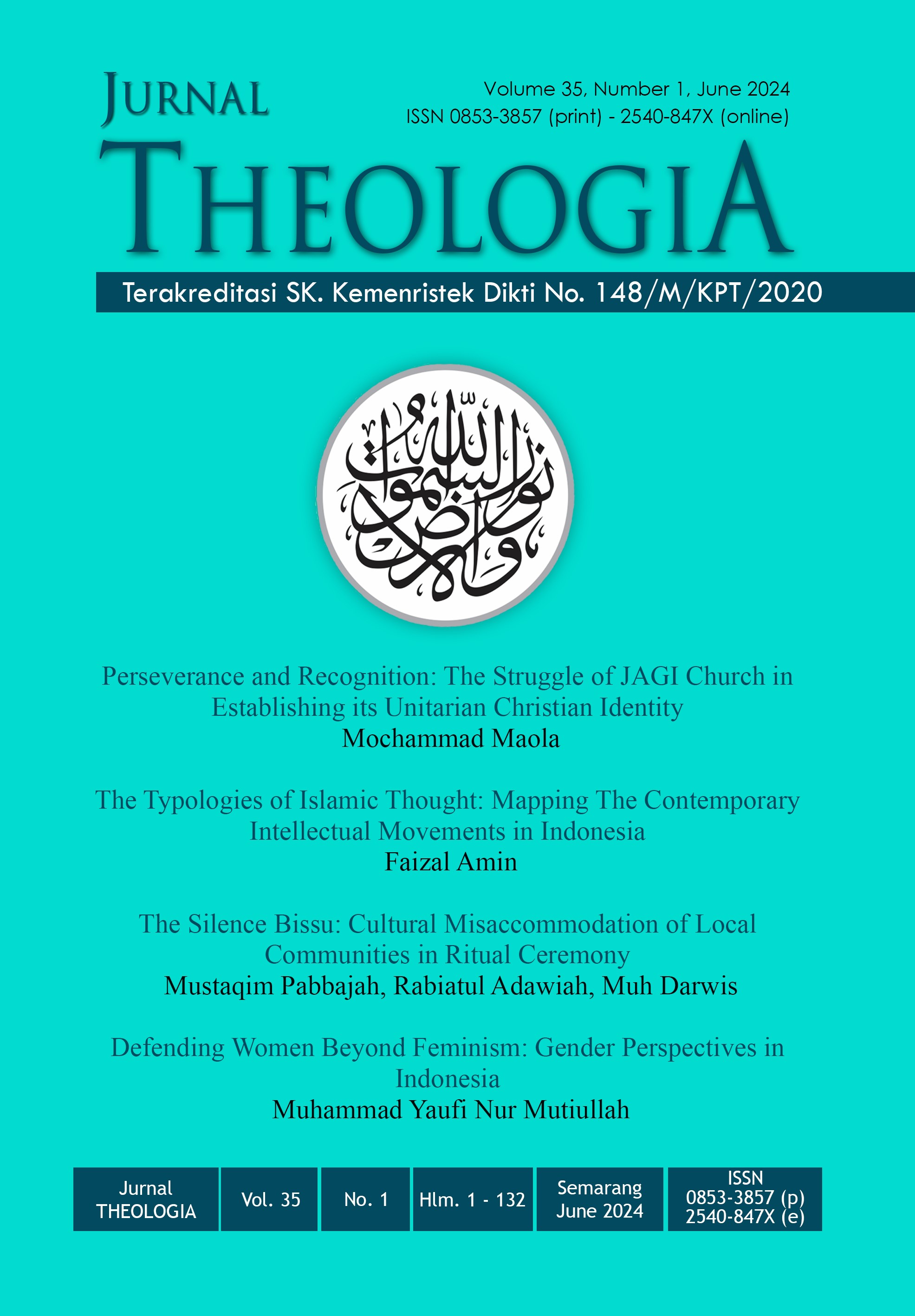The Role of al-Hamid Clan in Islamic Affairs at Petuanan Namatota and Petuanan Kumisi in Kaimana, West Papua
DOI:
https://doi.org/10.21580/teo.2024.35.2.23329Keywords:
Papuan Islam, Petuanan Namatota, Petuanan Kumisi, Al Hamid clan, Islamic SocietyAbstract
There have been many studies on Islam and Islamic societies in Papua. However, there have not been many studies on Arab descendants in Papua. Nevertheless, people of Arab descent have long been present in Papua and have played a significant role in developing the Islamic community in Papua. Therefore, discussing their role in the Papuan Muslim community is important. Based on this issue, the following article examines Papuans from the Al-Hamid clan in two chiefdoms in Kaimana, namely Petuanan Namatota and Petuanan Kumisi. The main issue discussed in this research is the Al-Hamid clan's role in Islamic affairs in the Namatota and Kumisi Chiefdoms in Kaimana. The research data were obtained through a literature review and fieldwork in Kaimana, West Papua. The results show that Papuans of Arab descent from the Al-Hamid clan play an important role in religious affairs in the Namatota and Kumisi Chiefdoms. People from Al-Hamid's descendants have been religious teachers, qadhi, mosque imams, and policymakers in Islamic religious affairs in the two chiefdoms since around the end of the 19th Century. Al-Hamid's descendants still carry out these roles, although they are delegated to other parties in some circumstances.
Downloads
References
Ahmad, Hasan. Interviewed, April 21, 2024.
Aituarauw, Monas. Interviewed, April 24, 2024.
Al Hakim, Luqman, and Dudung Abdurahman. “Moderasi Beragama Di Papua: Rekonstruksi Identitas Dan Resolusi Kehidupan Keagamaan Pasca Konflik Papua 1998-2001.” Jurnal Sosiologi Agama 17, no. 1 (2023): 49–64.
Al Hamid, Awad. Interviewed, April 24, 2024.
Al Hamid, Dahmad. Interviewed, April 24, 2024.
Al Hamid, Idrus. “Islam, Local ‘Strongmen’, and Multi-Track Diplomacies in Building Religious Harmony in Papua.” Journal of Indonesian Islam 14, no. 1 (2020): 113–38.
———. “Islam Politik Di Papua: Resistensi Dan Tantangan Membangun Perdamaian.” Millah 12, no. 2 (2013).
———. “Pedagogi Identitas Keagamaan: Official Knowledge Dan Interkulturalisme Pendidikan Islam Di Papua.” Jurnal Pendidikan Agama Islam 7, no. 1 (2019): 37–54.
Al Mudhar, Dullah. Interviewed, April 24, 2024.
Amal, M. Adnan. Kepulauan Rempah-Rempah: Perjalanan Sejarah Maluku Utara 1250-1950. Jakarta: Kepustakaan Populer Gramedia, 2010.
Clarence‐Smith, William Gervase. “The Economic Role of the Arab Community in Maluku, 1816 to 1940.” Indonesia and the Malay World 26, no. 74 (1998): 32–49.
Dasfordate, Aksilas, Yohanes Burdam, Senda Lely Merly, and Darmawan Edi Winoto. “Raja Ampat in Political Networks and Strategies of Sultan Nuku’s War Against the Dutch Company Istiyanatul.” In SHS Web Conference, Vol. 149, 2022.
Dute, Hasruddin. “Integrasi Islam Dan Budaya: Studi Budaya Bakar Batu Masyarakat Papua Pegunungan Di Kota Jayapura.” Jurnal Ilmiah Ilmu Ushuluddin 21, no. 1 (2022): 85–98.
Makatita, Ahmad Syarif, and Athoillah Islamy. “Paradigma Dakwah Islam Terhadap Budaya Lokal Masyarakat Papua : Integrasi Syariat Islam Dan Budaya Dalam Tradisi Bakar Batu Pada Komunitas Muslim Dani.” At-Taghyir 4, no. 2 (2022): 241–62.
Murisal, and Sisrazeni. Psikologi Sosial Integratif. Depok: Rajawali Pers, 2022.
Muslim, Abu. “Dakwah Peka Kultur Ala Aipon Asso: Potret Keberislaman Pegunungan Tengah Papua.” Harmoni 13, no. 3 (2014).
Ombaier, Fikri. Interviewed, April 25, 2024.
Ombaier, Randi. Interviewed, April 25, 2024.
Pamungkas, Cahyo. “Kontestasi Antar Orang Asli Papua Terhadap Hak Pertuanan Di Kaimana.” Masyarakat, Kebudayaan Dan Politik 29, no. 2 (2016): 75–89.
———. “Muslim Papua Dan Muslim Pendatang Pertarungan Identitas Antara Ke-Indonesia-an Dan Ke-Papua-An.” Kawistara 6, no. 3 (2016): 249–64.
———. “The Contestation of Muslim and Special Autonomy in Papua.” Religio: Jurnal Studi Agama-Agama 5, no. 1 (2015).
Rahman, Hendra Yulia. “Antara Sunnah Dan Tradisi: Khitan Muallaf Perempuan Baligh Di Jayapura, Papua.” Al Manahij 9, no. 2 (2015): 271–83.
Ridwan. “Radikalisme Islam, Pembangunan Perdamaian Dan Dialog Antar Agama Di Papua Indonesia.” Jurnal Ilmiah Ilmu Ushuluddin 21, no. 1 (2022): 69–84.
Sabara. “Kiprah Setengah Abad Yayasan Pendidikan Islam (YAPIS) Papua: Membangun Harmoni Beragama Melalui Dunia Pendidikan.” Jurnal Al-Qalam 24, no. 1 (2018): 65–72.
Wekke, Ismail Suardi. “Islam Di Papua Barat: Tradisi Dan Keberagaman.” Ulul Albab 14, no. 2 (2013): 117–34.
Wekke, Ismail Suardi, and Yulia Ratna Sari. “Tifa Syawat Dan Entitas Dakwah Dalam Budaya Islam: Studi Suku Kokoda Sorong Papua Barat.” Thaqafiyyat 13, no. 1 (2012): 163–86.
Downloads
Published
How to Cite
Issue
Section
License
Copyright (c) 2024 Jurnal Theologia

This work is licensed under a Creative Commons Attribution-NonCommercial-ShareAlike 4.0 International License.




















